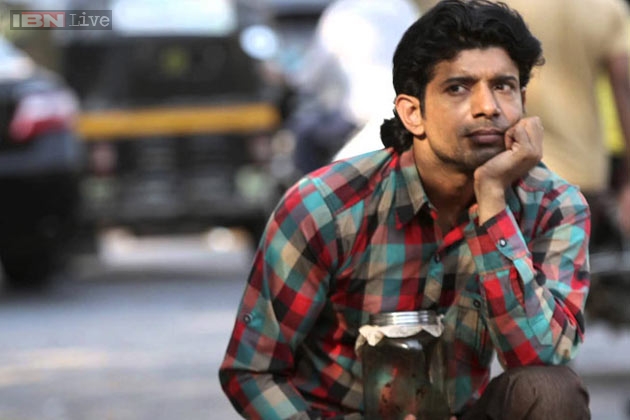In one of the early scenes in Mukkabaaz, we see the protagonist Shravan Kumar (Vineet Singh) complaining to his friend how being an athlete in his home state of Uttar Pradesh is a joke. But there is a sense of acceptance in his voice and demeanour; a sense that nothing can possibly happen that could change his fortunes. Minutes later, he finds a purpose to change his fortunes; or rather, the purpose finds him. Talk about masala tropes.
But Mukkabaaz isn’t a masala film. It isn’t Rocky, or Raging Bull, or Million Dollar Baby. It is a tough film to watch, and this is not because the plot is highly contrived or impossible to make sense of. It is tough because of the sheer multitude of things happening simultaneously in the screenplay, because of the multiple layers the audience is exposed to. The titular character has a truckload of conflicts that all play out at the same time - love, family, passion, revenge all concern him. One would think that Kashyap has been-there-done-that in Gangs of Wasseypur, but there is an important difference here. The screenplay does not separate these conflicts explicitly, and there is no spacing between the crescendo of each conflict. One could think that there is something inherently wrong about the way the script was written, which was my feeling during interval time.
The setting is pretty simple. Shravan Kumar is a boxer from a low-caste family who has fallen into trouble with Bhagwan Das Mishra (a perennially red-eyed Jimmy Shergill), who is the godfather without whom it is impossible for any boxer in Bareilly to play the championship. To add to that Shravan is in love with Sunaina (Zoya Hussain, badi khoobsurat), Bhagwan’s mute niece. It’s love-at-first-sight for both of them, which is something I had a problem with. Anyway, Shravan finally realizes that it is impossible for him to enter the championships from Bareilly and packs off to Varanasi to find Sanjay Kumar (Ravi Kishen).
Sanjay is an upright man. He is a good coach, and converts Shravan from a Mukkabaaz (brawler, street-fighter) into a Mukkebaaz (boxer). Shravan goes on to win the state championship, giving Bhagwan some in-your-face moments, landing himself a job in the railways, and marrying Sunaina along the way. The rest of the plot is a highly interwoven, and it is best to not speak of it for fear of spoilers.
Let’s talk about the performances one by one. Ravi Kishen puts up an honest-to-God portrayal of a man who, as a coach, is not ready to let anyone be bogged down by a system that failed him, even if he has to face extreme repercussions. Bhagwan is exactly the kind of guy who’d make life hell for anyone (like Sanjay) who comes in his way, and Shergill plays him to menacing perfection. He’s that guy who hides his weaknesses and incompetence (apparently unke beedi me tambaku nahi hai) with an overbearing personality, power and ruthlessness.
Sunaina is a strong woman. Kashyap never lets her be reduced to a caricature owing to her muteness. She’s as straightforward, demanding, and ready-to-fight as any other millennial woman. Zoya Hussain’s eyes make us cry and frown with them. I’d really watch out for her in the coming years.

Vineet Singh in Bombay Talkies. Highly recommended watch.
Which brings me to Vineet Singh. I had first seen him in Kashyap’s segment in Bombay Talkies (which also happens to have the best movie Karan Johar has made to-date), where he was very impressive as a fan trying to meet Mr. Bachchan and feed him his mother’s murabba. But here, he brings out his very best. It’s worthy to note that he is the writer of this film too. Shravan has many grave problems in his life, and that makes him a very difficult character to play. Vineet Singh doesn’t let us feel that the acting was very tough - he blends seamless into the environment of Bareilly and UP, which is really what the film is trying to critique. Infact Vineet is the one who creates the environment in the first place.
Anurag Kashyap has always had a penchant for picturizing songs (one of them has a very special special appearance :D ), and creating memorable dialogues, jo kisi aur se naa ho paata. Mukkabaaz is no different, and it reaffirms why Kashyap is the most pathbreaking director in the Hindi film industry today.
Now let’s come back briefly to the script. Mukkabaaz is inherently chaotic, as I had felt during at the interval. But this chaos is the director’s connivance, highly symbolic of the larger point the film is trying to make. Mukkabaaz is not just a film about boxing or even the sports scenario of India - it is a political and social commentary on India itself. And what better way to describe India than ‘chaos’? This commentary adds another thick layer on top of the already existing ones, and makes Mukkabaaz a truly tiring film to watch. It is fitting that the film ends with a highly sarcastic ‘Bharat Mata ki Jai!’. I haven’t watched Padmaavat yet, but I am sure Mukkabaaz would offend the intelligent Sangh or Sena faithful infinitely more.
Mukkabaaz is not Kashyap’s best, but, as I realized, trying to rank his films is an useless exercise. His universally panned film Bombay Velvet was something I personally enjoyed, though I could see its flaws. Mukkabaaz is then a film that, in some sense, projects India, in its wholesome state of chaos - one that it was, is and will always be.